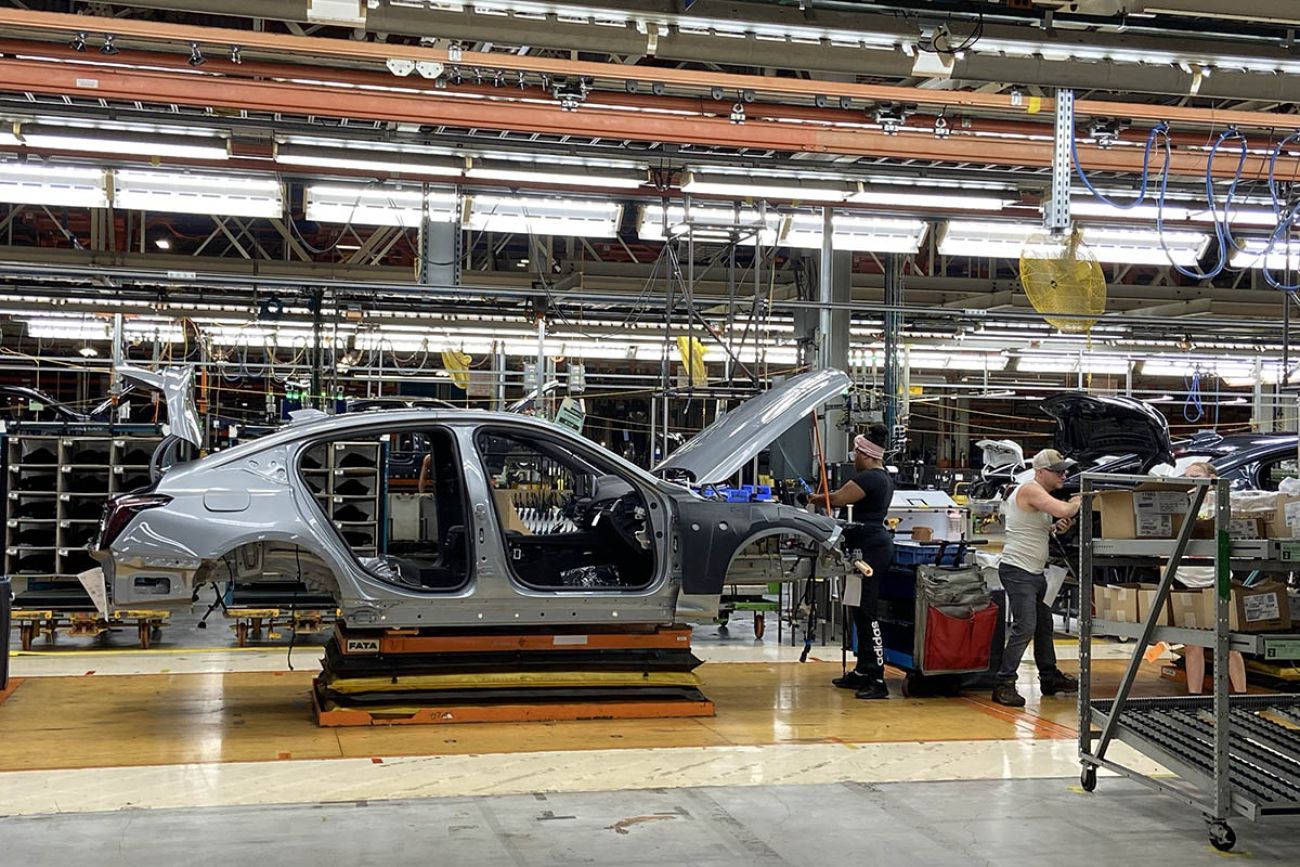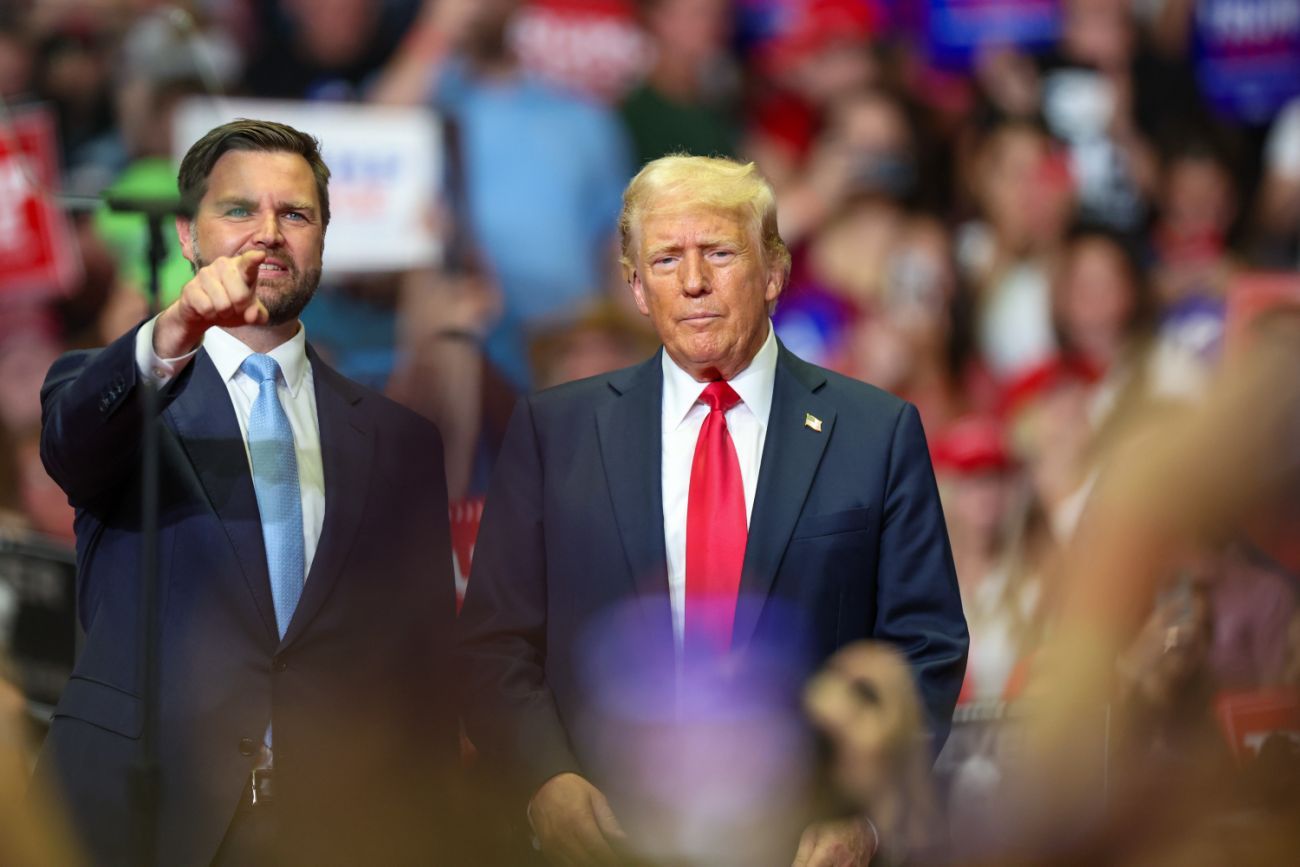Michigan a top winner of climate funds Trump wants to revoke

- Republican presidential nominee Donald Trump says he would revoke unspent funding under the Inflation Reduction Act climate law
- Michigan has been a top beneficiary of IRA funds,with 62 announced projects totaling $26.6 billion
- Trump running mate JD Vance, U.S. Senate candidate Mike Rogers have criticized $500 million GM grant to retool plant for electric vehicles
In Lansing, a General Motors plant that currently assembles internal combustion Cadillacs is being retooled to produce electric vehicles.
West of Marquette, the nation’s only nickel mine will expand its facilities to harvest “critical minerals” from waste rock, producing enough nickel for half-a-million EV batteries.
In southwest Michigan, the shuttered Palisades nuclear power plant is looking likely to reopen.
And across the state, homeowners are installing energy-efficient water heaters, airtight windows and rooftop solar panels to shrink their energy bills and their dependence on the fossil fuels that are superheating Earth’s atmosphere.
Related:
- Michigan elections FAQ: Where Trump, Harris stand on climate, Great Lakes
- Michigan plans big spending to insulate homes. But can it find contractors?
- Palisades nuclear relaunch gets more subsidies in Michigan — and more backlash
All are funded by billions of dollars from the Inflation Reduction Act, a landmark federal climate spending law that, if you believe campaign rhetoric, could be in the crosshairs if former former President Donald Trump is re-elected next year.
The IRA and other Biden-era climate policies have emerged as key topics on the presidential campaign trail, with Democratic nominee Vice President Kamala Harris promoting the plan that was enacted with her deciding vote, while Republican nominee Trump has called it a “green new scam” and promised to revoke unspent funds and expand tax breaks for fossil fuels.
“We will redirect that money for important projects like roads, bridges, dams, and we will not allow it to be spent on meaningless Green New Scam ideas,” Trump said in July at the Republican National Convention.
Few states have a greater stake in the debate than Michigan, which has won more IRA-funded projects than any other state, in part because the law focuses heavily on encouraging the automotive sector to produce electric vehicles.
But Zachary Kolodin, the state’s chief infrastructure officer who helps oversee Michigan's spending of IRA funds, isn’t overly concerned.
“The investment from the IRA has spurred development all across the country,” Kolodin told Bridge Michigan. “I think that whoever the next president is, is going to recognize that the momentum that the United States has in this sector is broadly shared, and will find it unappealing to want to roll back those provisions.”
Experts say while Trump would likely find it difficult to repeal or rewrite the IRA and other Biden-era climate spending policies, he could slow or redirect the flow of money in ways that would affect Michigan governments and businesses.

What’s in it for Michigan
The IRA narrowly passed along party lines in August 2022, devoting some $500 billion to climate change and health care priorities. Harris cast the deciding vote.
“While taking on the climate crisis and lowering utility bills for families, it is helping us to rebuild American manufacturing and drive American innovation,” Harris said in a recent statement celebrating the act’s two-year anniversary.
Using money from tax reforms, the law aims to jumpstart the U.S. energy transition by subsidizing things like EV manufacturing, nuclear energy development, electrical grid improvements and home energy efficiency projects.
The bulk of that money has funded projects in red or swing states. Michigan has been a particularly big winner, with 62 announced projects totaling $26.6 billion in new investment since the IRA’s passage. That’s more than any other state, according to an analysis from Climate Power.
But only six of those projects are operational so far, leaving many of the rest vulnerable to clawbacks if Trump fulfills his campaign promise to revoke IRA spending.
Much of the money has been funneled to the state’s auto industry to hasten the transition to electric vehicles. In addition to site-specific grants like the $500 million awarded to the Lansing GM plant, Michigan companies are expected to benefit heavily from IRA tax credits that support EV-related production and make it cheaper for consumers to buy EVs.
State, local and tribal governments have also won hundreds of millions of dollars to expand EV charging infrastructure, build renewable energy arrays and offer rebates for residents to insulate their homes or buy more efficient appliances.
Lansing Mayor Andy Schor said the millions his city has received — including $8 million to install EV chargers and $5 million to bolster the city’s tree canopy — are part of a welcome windfall for local governments that have long been starved of federal funding.
“My first, you know, five, six years (in office), mayors all around the country, we held what was called Infrastructure Week, where we begged and pleaded for money for infrastructure,” Schor said. “Now, you know, we're not begging and pleading. We're trying to capture as much of it as we can.”
Some Republican officials feel differently, including Rep. John James, who represents the 10th Congressional District where Stellantis recently announced plans to retool two facilities for EV production.
James has criticized IRA incentives for EVs, saying in a statement that they put “all 77,580 manufacturing jobs in Michigan's 10th Congressional District at great risk of extinction.”

When rhetoric meets reality
While Trump has vowed to “terminate” federal programs that encourage electric vehicles, his campaign has offered few specifics about which provisions of the IRA he would target if elected. It’s also unclear whether that effort would extend to climate initiatives contained in the 2021 federal infrastructure law, which has funded EV chargers and other green initiatives.
Trump running mate JD Vance this month criticized the $500 million grant for Lansing’s Grand River Assembly Plant and would not commit to honoring the spending promised by the Biden administration. Republican U.S. Senate candidate Mike Rogers has called it a “bad investment” the federal government should reconsider.
Experts say it would be virtually impossible to claw back money that has already left federal coffers, and difficult to garner the congressional support needed to repeal or rewrite the law.
Although Republicans have regained control of the House since the IRA’s passage and could retake the Senate in next year, some congressional Republicans have indicated they won’t support rollbacks now that the IRA is benefitting their districts.
Still, Trump could use other methods to slow the flow of IRA funds, said Barry Rabe, a University of Michigan political scientist who studies the politics behind environmental policy.
Trump wants to restore presidential impoundment authority, or the right to withhold spending that Congress has already approved. And even without such power, Rabe said, the executive branch can use its rulemaking power to slow-walk implementation of the IRA.
“Quite often an administration has a lot of latitude of, what are the rules? What are the mechanisms for grants?” Rabe said. “And if you think there's a problem, you declare a problem and sort of freeze the process and revisit it.”
A question with no answer
The lack of specifics from Trump make it difficult to say what a shift in federal climate spending would mean for Michigan.
While money that has already left federal coffers likely couldn’t be clawed back, Michigan governments, businesses and individuals are slated to receive hundreds of millions of dollars that haven’t yet been disbursed.
That includes a portion of the $110 million due to Michigan through 2026 to build out the state’s EV charging network, $211 million for home energy rebates to help residents buy heat pumps, insulation and energy-efficient appliances, and $100 million for Muskegon-based Mitra Chem to build the nation’s first commercial production plant for lithium iron phosphate cathode materials used in EVs and defense.
It also includes federal tax credits available to residents for home energy upgrades. Data from the Internal Revenue Service shows 117,000 Michigan households tapped into those credits last year, reaping a total savings of $134 million.
Jessica Stites, whose family runs Zilka Heating and Cooling in Sylvan Lake, said she’s not concerned about how a potential end to those incentives would affect the business.
Money off the price of a heating or cooling system is a bonus for some customers, Stites said, but weather is the real driver of their decision to replace aging equipment.
“We’re busy when it’s below zero, or above 80,” Stites said, and the availability of tax credits hasn’t changed that rhythm.
Hugh McDiarmid, a spokesperson for the Michigan Department of Environment, Great Lakes and Energy, declined to say whether EGLE is preparing for the possibility that the next White House could curtail IRA disbursements.
Private companies that stand to benefit from future IRA disbursements are also watching and waiting for more details.
The president and CEO of the auto industry lobbying group Alliance for Automotive Innovation, whose members include the Detroit Three, warned in a recent blog post that “regulatory and policy ping pong” could harm U.S. automakers as they struggle for a share of the global EV market.
Last month, the U.S. Department of Energy announced a $145 million for Houghton-based Revex Technologies to extract critical minerals from waste rock piles at the Eagle nickel mine west of Marquette. But before receiving the money, officials with Revex and Eagle Mine must negotiate details with the federal government.
Given Trump’s criticisms of the IRA, Eagle Mine spokesman Matt Johnson said company officials are faced with “a question we don’t know how to answer:” Could the grant be revoked?
Michigan Environment Watch
Michigan Environment Watch examines how public policy, industry, and other factors interact with the state’s trove of natural resources.
- See full coverage
- Subscribe
- Share tips and questions with Bridge environment reporter Kelly House
Michigan Environment Watch is made possible by generous financial support from:
Our generous Environment Watch underwriters encourage Bridge Michigan readers to also support civic journalism by becoming Bridge members. Please consider joining today.
See what new members are saying about why they donated to Bridge Michigan:
- “In order for this information to be accurate and unbiased it must be underwritten by its readers, not by special interests.” - Larry S.
- “Not many other media sources report on the topics Bridge does.” - Susan B.
- “Your journalism is outstanding and rare these days.” - Mark S.
If you want to ensure the future of nonpartisan, nonprofit Michigan journalism, please become a member today. You, too, will be asked why you donated and maybe we'll feature your quote next time!






